- Home
- Charles L. Grant
In the Mood - [Millennium Quartet 02] Page 3
In the Mood - [Millennium Quartet 02] Read online
Page 3
He would indeed pray while he was cleaning up, not so much that the chariot wouldn’t leave its mark as for the hope that his father wouldn’t find out he’d been in trouble again.
Knox Bannock wasn’t a cruel man, but he was prairie hard. No nonsense, few frills. A well-liked, competent member of the Nebraska State Police who seldom relaxed that same mental discipline at home. Willing to allow John his youthful exuberance only as long as it didn’t upset his mother.
Son, he would say, one tear from your mother’s eye and you won’t sit down for a week.
Praying in the shower was one way around it.
John smiled as he drifted, dozed, for no reason he could think of suddenly feeling a whole lot better.
Drifting.
Thinking that when he got up again, he would shower, change clothes, and have a decent breakfast for a change. No liquor, just food. Good, healthy food, even if it killed him. After that he would take a break, walk the riverfront, breathe some fresh air, eat a good healthy lunch, and maybe, just maybe, he wouldn’t have to listen to the ghosts tonight.
Maybe, just maybe, he would finally find his son.
And the woman who took him away.
* * * *
3
T
he Royal Cajun was an old hotel, lost amid the newer construction near the Quarter and along the river, with no real desire to call attention to itself. It had the requisite ironwork filigree and hanging ferns for its balconies, tall shutters for its windows on the lower floors, and a peeling weathered facade for those who didn’t want the pretensions, or the glitter, or the constant noise of constant travelers.
The lobby was small, of hardwood and scattered fringed rugs, potted plants and brass spittoons; ceiling fans and squared mahogany pillars, gaslight fixtures on paneled walls, and low glass-top tables beside brocaded Queen Annes and upholstered club chairs faded and low and comfortably worn.
At the back was the registration desk, at least one clerk on duty at all times, seldom more, never less. To the left, in front, was the Bayou Cafe, open to the lobby, and beside it, behind dark paneling punctuated with etched tinted glass, the Cajun Lounge. To the right were two elevators and a gift shop. In the center, angling down in front of the elevators from the right, a wide carpeted staircase that led to the mezzanine, the meeting, rooms, banquet rooms, and a restaurant where “proper attire required” justified its high evening prices.
John had gotten into the habit of taking the elevator to the mezzanine because he liked walking down the stairs, one hand gliding lightly along the curved bannister. A descent into silence and color. No matter how many people sat or waited in the lobby, all voices seemed muted. They nodded greetings rather than calling out; they conversed with heads or chairs close together, and the occasional burst of laughter was swallowed by the plants and the carpets, scattered by the fans.
On the bottom step he paused.
A glance left to the entrance showed him a white glare through which traffic shadows darted. The heat had returned, yesterday’s rain already turned to steam. It made him uncomfortable just thinking about it. It definitely helped him decide not to go out to eat.
The café was nearly empty just an hour shy of noon, and for that small miracle he was grateful. There was something about him—the Lincoln Factor, he had once called it sourly—that made perfect strangers want to pull up a chair and tell him their life stories. All the details. All the miseries. Things, he guessed, they wouldn’t even tell their shrinks or spouses. It both amused and appalled him, and he seldom had the nerve to tell them to go away.
The room was done in shrimp and white, with swampland depicted in murals on all the walls, complete with Spanish moss and gators, herons and knobby cypress. He took the booth farthest from the entrance, touched his hip pocket to be sure he still had his wallet, and reached over to a neighboring table to grab a newspaper a patron had left behind.
“Morning, Mr. Bannock,” the waitress said. A medium-size woman made tall by her hair, a mass of rich auburn all sweeps and curls. A pink-and-white uniform with a skirt that only flirted with her knees. A pleasant face, whose angles would sharpen as she grew older. “Usual?”
“Please, Lisse.” He smiled up at her. “Heck of a rain last night.”
Thin lips pouted. “Shoo, ain’t going to do nothing. Too hard and too short.’” She giggled. “Just like my ex.”
He laughed as he was expected to; as, as a matter of fact, he didn’t mind doing. She was far from beautiful, but attractive just the same. The joke about her ex was just that— a joke. As best he could figure, she didn’t even have an ex-boyfriend. They had flirted since that first morning last week, a courtship safe and distant until, two days ago, she had deliberately mistotaled the bill in his favor. He had a feeling that if he asked her out, she’d be naked before they reached the elevator.
She leaned over and tapped the front page with her pencil. The scent of fresh soap and perfume; a view, if he chose, of what lurked between the two open buttons of her top.
“Bad stuff there, you know?”
A story below the fold, yet another harrowing account of starvation in central Africa, deprivation and cannibalism in southern India, and China’s continual denial that its people were desperately short of food. Calls for humanitarian aid; demands for relief.
She tapped the paper again. “I heard someplace in Europe they were rationing meat, can you beat it?”
“Germany,” he said absently. And added, “Which reminds me, I’m hungry.”
“Oh ... you!” She rapped him on the skull with the pencil, giggled, and walked away.
He didn’t dare look. She was a little too thin for his taste, but what she had she knew how to move. And she knew he enjoyed it.
His eyes closed briefly before he switched to the sports section. I must be getting old, he thought, checking baseball’s countdown to the World Series; it’s getting too easy to pass something like that up.
Out in the lobby a telephone rang softly.
His stomach grumbled, obscenely loud, and he looked around quickly as if there were someone to overhear. He should have come down as soon as he had gotten up, but the ghosts had been too strong. He had already taken three hours to continue transcribing the latest tape into his laptop, not listening this time. Just typing the words. A woman awaiting execution in Angola who had poisoned thirteen people. Her lucky number, she had said with a half-hearted grin. Fourteen, and she was sure she would never have been caught.
* * * *
You know, Mr. Bannock, I ain’t a stupid woman. I know better, you know what I mean? Thirteen, fourteen, ain’t no difference but one, but I just knew deep down that one more would make it all right. Wouldn’t though, would it? Would have been just another notch, so to speak.
Ruesette, the way I read this, you didn’t even try.
Nope.
Why not?
Didn’t feel like it.
* * * *
Lisse poured him a cup of coffee.
A heavyset elderly man in a Panama hat and rumpled white suit waited patiently at the hostess station until Lisse finally noticed him and brought him to a table on the far side of the room. Once he was settled, she pushed into the kitchen, returned a few seconds later with John’s meal— sausage, scrambled eggs, hash browns, orange juice, a side order of toast fairly soggy with fresh butter.
Without invitation she sat opposite him, scribbling on the bill. “That stuff’s gonna kill you, you know.”
“My heart can take it.”
“You still working on that book?”
He nodded.
His first mistake happened on the second morning, when he’d brought his laptop down so he could work while he ate. She had been impressed, and he had been in need of impressing someone. Before he knew it, she was clipping murder stories from the papers, from magazines at the beauty parlor, and telling him stories she had heard from the friend of a friend who had a cousin in Baton Rouge who knew this guy in the sheriff’
s office.
It passed the time, but it drove him nuts.
Yet she had been genuinely concerned when she found out he was interviewing a serial killer at Angola.
“Lord, that’s dangerous work,” she called it in a hushed voice. “They all know each other, you know. You got to be real careful around people like that.”
For a change he had kept his comments to himself.
She finished the bill, turned it over, and slid it across the table. Leaned back and looked at him through eyes half closed.
“You’re going soon?”
He kept chewing, holding up a hand to tell her to hang on, he’d be done in a second. The question had startled him. He hadn’t really thought about it, but it was true. With Ruesette’s interview over, there was really no reason for him to stick around much longer. There was the money, for one thing; he didn’t have much left. For another, there was the book.
What was left of it, that is.
He swallowed, took some coffee, and finally, reluctantly, nodded.
She sighed without making a sound, folding her arms under her breasts.
“What’s the matter?”
She shrugged with a tilt of her head. “I don’t know. Kind of used to having you around, that’s all, I guess.” She glanced over to the old man in the Panama hat. “Folks come here, they don’t stay very long. You’re kind of a treat, you know what I mean?”
He forced a laugh. “My ex-wife didn’t think so.”
Another shrug, this time with her shoulders. “Her loss.”
“Damn right.”
Her lips almost smiled as she slid out of the booth. “So you let me know when’s your last day, huh? I’ll fix you something special. My own self.”
No innuendo; just a promise.
“I’ll do that.”
The smile was there, rueful and resigned, before she walked away. No sway this time.
John stared at his plate. Well, he thought, you have a real knack, don’t you. She’s not looking long-term, you dope. If the choice is between you and the guy in the white suit...
He finished, Lisse poured him another cup, and he sat back, watching the languid motion of guests in the lobby. Like watching a fish tank, different species drifting here and there, more than likely ending up at registration for a quick question, a search for messages, and drifting again. Once in a while vanishing into the glare.
Lisse fussed behind the counter at the hostess station, changing the breakfast menus for lunch, absently making change for the old man who clearly wanted to talk, picking up the phone there to take an order for room service.
He couldn’t stand it any longer.
When she finally turned in his direction, he lifted a hand.
She ignored it.
He waggled his fingers.
She ignored him.
He warned himself he was making a huge mistake. There was no need, no reason to pursue this. She was a waitress, he had been a steady customer, that’s all there was to it. Feeling guilty was dumb. It made no sense. For God’s sake, he had spent the past two years practically living with people who killed other people in bunches, in droves, just so he could see his damn name on the cover of a damn book his own mother probably wouldn’t buy.
What was the point?
He blinked.
The point of what?
* * * *
Ruesette, a man I talked to—
For the book?
Yes.
He gonna be in it?
I think so.
Me, too?
I would say so, yes.
Wow. Hope I’m around to read it.
I do, too, Ruesette, I do, too. But hang on a minute, okay? This man I talked to, up in Michigan, he told me that while he was... waiting—
Death row, Mr. Bannock. You can say it. It’s okay.
Yeah, well... he said something that has me wondering. He said he wasn’t afraid of dying because he knew God knew it was all right. A woman, not much older than you, she said almost the same thing. In New York. I know from talking to you, from reading your files, that you were a churchgoing woman. You think God is all right with you, too?
Oh, sure.
Why? I mean, Ruesette, you killed all those people. Do you mean you’ve made your peace and you think God has forgiven you?
Well, I don’t know about the forgiveness part, Mr. Bannock, but I know it’s all right with Him. I mean, it was all part of the plan, right? I mean, that was the whole point.
* * * *
He blinked again, angry that the ghosts should be visiting him now. Out here. Where he wanted nothing more than a little respite, a little peace. Somehow it just didn’t seem fair. No one had told him it would be like this.
No one had told him there would be something wrong with the project. A flaw. He knew it was there, he could sense it, but he couldn’t pin it down. Probably, as his mother often complained, it was right there in front of him, plain as the nose on his face. But he couldn’t see the damn thing.
He just couldn’t see it.
Unless, of course, he was wrong, and it was only all those men and women waiting to die that was getting to him.
Making him crazy.
What he needed was a major diversion, something to keep the ghosts at bay until he could think more clearly, gain some decent perspective.
What he needed was Patty and Joey.
But he, and the book, were the reasons they were gone in the first place.
He stared at the dregs of the coffee in his cup and grunted when he saw liquor there instead. Could taste it. Could smell it. Could feel it in his belly. Doing its job. It would be a diversion, all right. It would certainly get him focused on something else.
He looked away in disgust—you’re pathetic, Bannock, really pathetic—and was distracted by soft insistent voices. It took a moment before he saw the old man standing at the counter, hat in both hands, smiling at Lisse. It wasn’t a pleasant smile. It was the smile of a man who always got his way and brooked no refusals.
Without thinking, John grabbed his check and hurried over.
“Really, sir,” Lisse said, and shook her head emphatically.
“We all have options, my dear,” the old man said. Insisted. Politely.
“Hi,” John said, dropping his check onto the counter.
“Enjoy your meal?” she asked with professional politeness, ringing the charges on the register.
“Absolutely. Thanks.”
“My pleasure.”
The old man watched him.
John could feel it.
“Shall I put this on your bill?”
“Please, thanks.”
“Young lady,” said the old man, scolding. “Please. We were talking.”
John turned away, and turned back. “Oh, and don’t forget tonight. You think seven, seven-thirty will be okay?”
Lisse didn’t falter. Her professional smile became a personal one. “Sure, John, that’ll be just fine. Make it seven-thirty, though, give me some time to get ready. Nothing fancy, right?”
“Absolutely.” He touched her arm, said, “Good afternoon,” to the old man, and walked toward the staircase. He heard nothing behind him, but he felt it again—the old man’s stare. He was tempted to check over his shoulder; he was tempted to head straight for the desk and tell them he was leaving now, get his bill ready; he was tempted to head straight for the river and wade in until the current took him.
Instead, he felt a curious giddiness that fluttered around his stomach, and a familiar but long dormant grin fighting to shape his lips.
Jesus Christ, he thought in a rush of panic and delight, there’s no way out of it now. I’m going on a date.
Halfway up the staircase he couldn’t help it—he looked back.
The man in the white suit was gone. Lisse was out of sight. The clerks were gone. The lobby was deserted.
On the registration counter the telephone rang softly.
No one answered.
* *
* *
4
D
orina Castro wondered what it would cost if, the next time she was offered, she refused to attend an industry conference. Not that it would be a realistic option. But assuming, just for kicks, they came to her and gave her the opportunity to decline. What would it cost her? What harm would it do? Everyone knew these four- and five-day exercises in corporate education were only excuses to get out of the office. Everyone knew that once the day’s activities were over, the watchword wasn’t study, it was party. As fast and as hard as you can without throwing up on one of the execs.

![[Oxrun Station] The Orchard Read online](http://i1.bookreadfree.com/i/03/17/oxrun_station_the_orchard_preview.jpg) [Oxrun Station] The Orchard
[Oxrun Station] The Orchard![Riders in the Sky - [Millennium Quartet 04] Read online](http://i1.bookreadfree.com/i/03/20/riders_in_the_sky_-_millennium_quartet_04_preview.jpg) Riders in the Sky - [Millennium Quartet 04]
Riders in the Sky - [Millennium Quartet 04]![Chariot - [Millennium Quartet 03] Read online](http://i1.bookreadfree.com/i/03/19/chariot_-_millennium_quartet_03_preview.jpg) Chariot - [Millennium Quartet 03]
Chariot - [Millennium Quartet 03]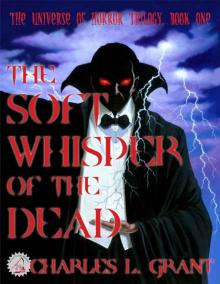 The Universe of Horror Volume 1: The Soft Whisper of the Dead (Neccon Classic Horror)
The Universe of Horror Volume 1: The Soft Whisper of the Dead (Neccon Classic Horror)![[Oxrun Station] Dialing The Wind Read online](http://i1.bookreadfree.com/i/03/19/oxrun_station_dialing_the_wind_preview.jpg) [Oxrun Station] Dialing The Wind
[Oxrun Station] Dialing The Wind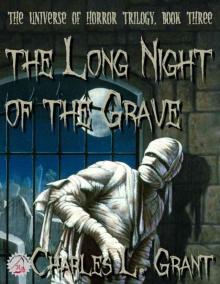 The Universe of Horror Volume 3: The Long Night of the Grave (Neccon Classic Horror)
The Universe of Horror Volume 3: The Long Night of the Grave (Neccon Classic Horror) The Grave - An Oxrun Station Novel (Oxrun Station Novels)
The Grave - An Oxrun Station Novel (Oxrun Station Novels)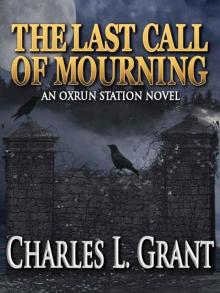 The Last Call of Mourning - An Oxrun Station Novel (Oxrun Station Novels)
The Last Call of Mourning - An Oxrun Station Novel (Oxrun Station Novels) The Complete Short Fiction of Charles L. Grant, Volume IV: The Black Carousel
The Complete Short Fiction of Charles L. Grant, Volume IV: The Black Carousel The Bloodwind - An Oxrun Station Novel (Oxrun Station Novels)
The Bloodwind - An Oxrun Station Novel (Oxrun Station Novels)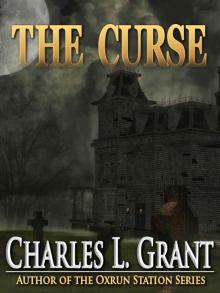 The Curse
The Curse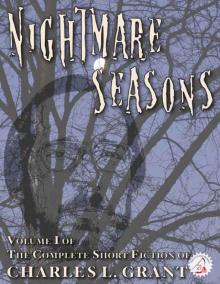 The Complete Short Fiction of Charles L. Grant Volume 1: Nightmare Seasons (Necon Classic Horror)
The Complete Short Fiction of Charles L. Grant Volume 1: Nightmare Seasons (Necon Classic Horror)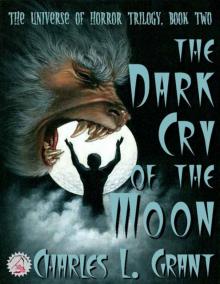 The Universe of Horror Volume 2: The Dark Cry of the Moon (Neccon Classic Horror)
The Universe of Horror Volume 2: The Dark Cry of the Moon (Neccon Classic Horror) Watcher: Based on the Apocalypse (World of Darkness : Werewolf)
Watcher: Based on the Apocalypse (World of Darkness : Werewolf)![[Oxrun Station] The Bloodwind Read online](http://i1.bookreadfree.com/i/03/25/oxrun_station_the_bloodwind_preview.jpg) [Oxrun Station] The Bloodwind
[Oxrun Station] The Bloodwind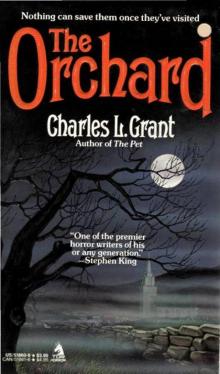 The Orchard
The Orchard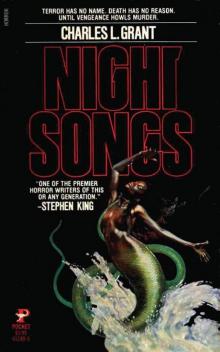 Night Songs
Night Songs Shadows 3
Shadows 3![Symphony - [Millennium Quartet 01] Read online](http://i1.bookreadfree.com/i1/04/02/symphony_-_millennium_quartet_01_preview.jpg) Symphony - [Millennium Quartet 01]
Symphony - [Millennium Quartet 01] The Hour of the Oxrun Dead (Necon Classic Horror)
The Hour of the Oxrun Dead (Necon Classic Horror)![In the Mood - [Millennium Quartet 02] Read online](http://i1.bookreadfree.com/i1/03/31/in_the_mood_-_millennium_quartet_02_preview.jpg) In the Mood - [Millennium Quartet 02]
In the Mood - [Millennium Quartet 02] The Complete Short Fiction of Charles L. Grant Volume 3: Dialing the Wind (Neccon Classic Horror)
The Complete Short Fiction of Charles L. Grant Volume 3: Dialing the Wind (Neccon Classic Horror)![[Oxrun Station] The Last Call of Mourning Read online](http://i1.bookreadfree.com/i2/04/05/oxrun_station_the_last_call_of_mourning_preview.jpg) [Oxrun Station] The Last Call of Mourning
[Oxrun Station] The Last Call of Mourning The Pet
The Pet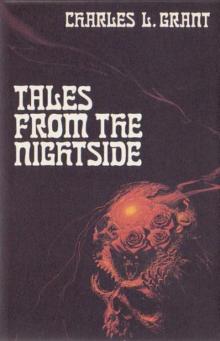 Tales from the Nightside
Tales from the Nightside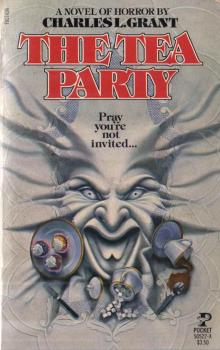 The Tea Party - A Novel of Horror
The Tea Party - A Novel of Horror The Complete Short Fiction of Charles L. Grant Volume 2: The Orchard (Necon Classic Horror)
The Complete Short Fiction of Charles L. Grant Volume 2: The Orchard (Necon Classic Horror) Whirlwind
Whirlwind Jackals
Jackals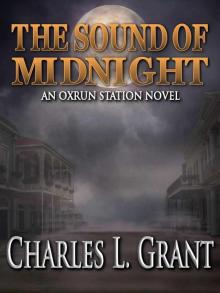 The Sound of Midnight - An Oxrun Station Novel
The Sound of Midnight - An Oxrun Station Novel